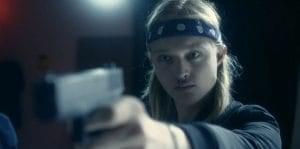
School shootings rank pretty high on the list of taboo subjects for movies, and it’s no shock that only a handful of films have dared to reopen that particular wound on the American consciousness.
That’s not to say that a thoughtful, non-exploitative take on the phenomenon is impossible to pull off, as Gus Van Sant proved in 2003 with his minimalist drama Elephant. Released less than a half-decade after the Columbine tragedy, the film was nuanced and sensitive when it could have been sensationalistic, understated and meditative when it could have been melodramatic. It proved that school shootings needn’t be off-limits for filmmakers if handled with care.
The same can hardly be said of Ditch Party, a well-intentioned but wrongheaded indie ensemble piece that features plenty of drama-club emoting, hackneyed hostage-movie suspense, and ill-advised attempts at humor, meanwhile offering only the most obvious and banal insights into the realities of school violence to justify its own existence. About the best that can be said regarding the film, written by Richard Meese and directed by Rocky Costanzo, is that it makes an effort to remain tasteful – the bloodletting is relatively restrained and the teenage characters (oddly) never curse or talk about sex – but its simplistic and tonally muddled approach to the touchiest of subjects make it a pretty offensive watch nonetheless.
Filmed at an actual California high school but set mostly in its nondescript basement, Ditch Party focuses on a handful of students who all receive a mysterious text message inviting them to cut class and attend the titular ditch party in a vacant storage room in the school’s under-construction wing. Each of them is pretty easily pegged as a particular American teenage stereotype. There’s the typically Type A class president (Bianca Cueva), an appearance-obsessed prom king (Darian Weiss), a politically inclined pothead (Anthony Guajardo), a misunderstood “bad-girl” type (Molly McIntyre), and a clean-cut star football player (Malcolm Xavier). They come from (obviously) different social circles and immediately clash over their (obvious) differences, but when the shooting starts on the floors up above, they’re forced to hunker down together in their relatively safe hiding place, getting to know each other better in the process.
“…if Ditch Party is generally inoffensive in execution, it still feels exploitative on a conceptual level.”
That setup, though contrived, isn’t a terrible one, but the characters’ internal conflicts and eventual moments of mutual understanding rarely rise above cliché (demanding parents, struggles with popularity, body-image issues, etc.), and the dialogue is often soap-opera trite – that is, when it isn’t injecting lame sitcom jokes into what should otherwise be a harrowing situation. On top of that, logic and common sense take a long lunch break throughout. There are some nonsensical rules about the kids’ cell phones and why they can’t use them at will; characters shout at one another and slam furniture around even after they’re advised by the (mostly unseen) police to remain quiet; and said police are so ineffectual in handling the situation that they end up making the bullhorn-wielding buffoons in Die Hard look like the pinnacle of movie law-enforcement competence.
The cast is certainly committed, though their best efforts are more often than not undercut by the film’s stilted dialogue and amateurish blocking; if nothing else, they do at least manage to feel like actual high school students rather than twentysomething thespians with awkward teenage affectations. The most recognizable face is that of the shooter himself, played by Daeg Faerch, the kid Rob Zombie cast as young Michael Myers in his 2007 Halloween remake. Aside from a short prologue sequence – actually, one of the film’s most effectively unnerving – he’s an invisible presence for most of the first two acts, much-discussed but rarely encountered. That turns out to be for the better, because when he does finally cross paths with the holed-up main characters, he has a tendency toward monologues that wouldn’t pass muster for a third-rate Walking Dead villain. Faerch certainly attempts to evoke some fear, but the character is woefully underwritten, emerging more as a composite of various movie-villain tics rather than anything based in emotional reality. That’s not a good look at all.
If that character and his actions were left out entirely, it’s not hard to imagine Ditch Party as a more palatable – or, at the very least, more innocuous – movie. Its messages about the dangers of bullying and the importance of seeing past superficial differences are worthy enough, and it’s entirely possible that the characterizations, as one-dimensional as they are, could nevertheless ring true for a high school-aged audience. But the film wildly overreaches in taking on a subject that even most of the sharpest minds in American moviemaking have shrunk away from, and it’s never successful in wringing any real emotional or intellectual response out of it other than the occasional thought of, “oh, they’re really gonna go there, huh?”
Thus, even if Ditch Party is generally inoffensive in execution, it still feels exploitative on a conceptual level. There are probably still some perceptive, poignant independent films to be made that broach the topic of school shootings, but Ditch Party‘s real contribution to that body of work is, unfortunately, its template for what not to do.

Ditch Party (2015). Directed by Rocky Costanzo. Written by Richard Meese. Starring Daeg Faerch, Molly McIntyre, Malcolm Xavier, Darian Weiss, Bianca Cueva, Anthony Guajardo, Noel Gugliemi
1 star out of 5
https://www.youtube.com/watch?v=AXxm_TMZWYo

What an a-hole of the main character also known as daeg faerch to take a very sensitive issue and turn it into a movie. What the hell were the movie directors and producers thinking(if at all) …whats your next movie? taking the 911 incident and upsetting more people. Honestly daeg faerch is or are there any other rolls you can act.